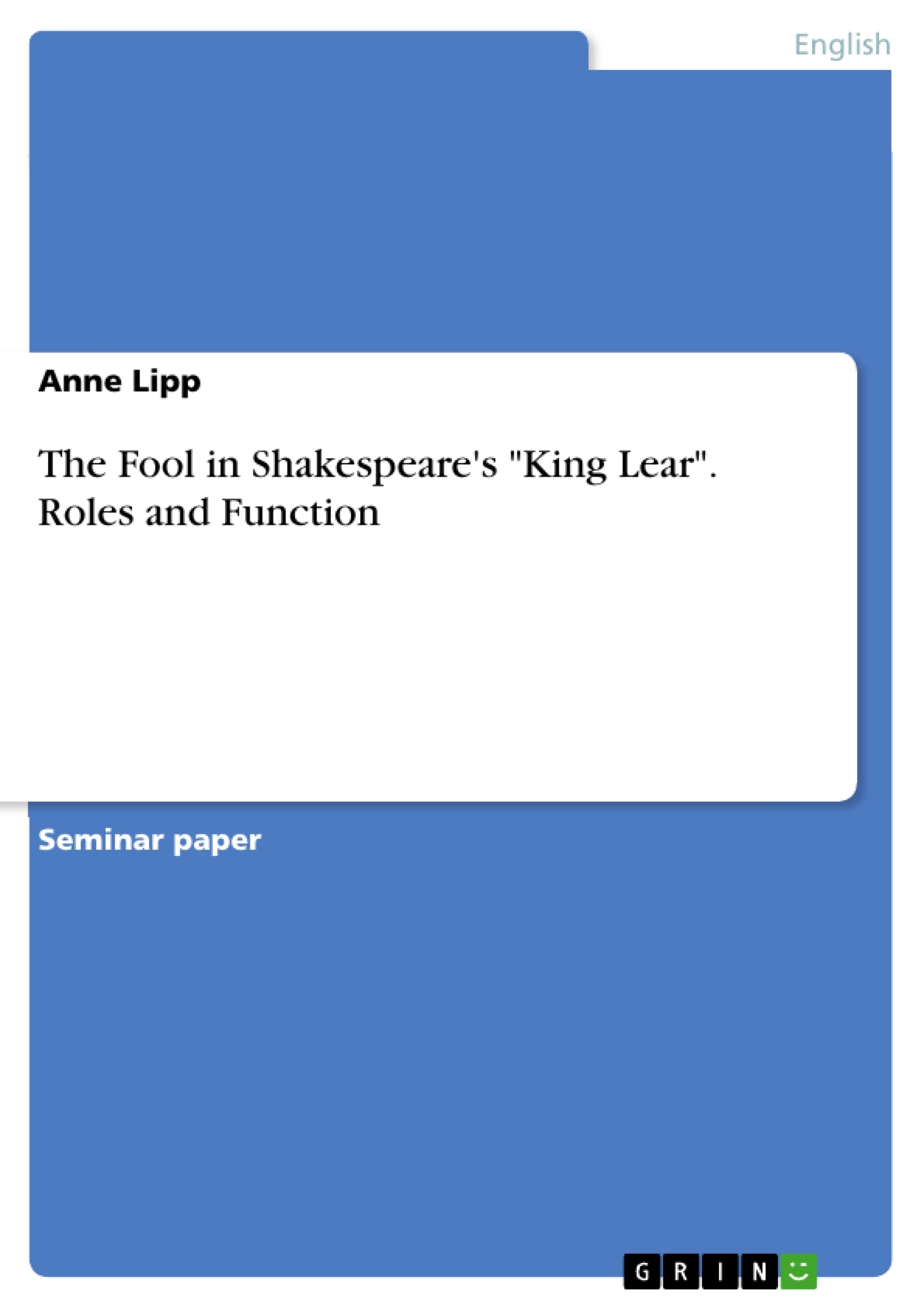Throughout history the traditional function of the fool in a royal household was to entertain the members of the court by being an imbecile and a jester. In "King Lear" Shakespeare allows his Fool to take over the unique position of the person who is able to correct his master without being punished. Nevertheless, the Fool does not seem to have any direct influence on the behavior of the king, as he is not taken seriously. The aim of this paper is to present the various roles of the Fool and to analyze his function within the play.
Throughout the play the Fool takes over the role of the person who constantly reminds Lear of his mistakes in order to enlighten him and make him realize his folly. He first appears in the middle of Act I Scene IV of the play and immediately points out that Lear has made a mistake by dividing his kingdom among his daughters. When talking to Kent he says:
[…] if thou follow him [King Lear] thou must needs
wear my coxcomb. How now, Nuncle! Would
I had two coxcombs and two daughters!
(King Lear, Act I, sc. iv, l. 109-111)
In this scene the Fool is offering his coxcomb to Kent. By referring to his cap as a coxcomb , he uses the ambiguous meaning of this word in order to suggest the king to be the fool rather than himself. Kent before him had criticized Lear for his decision causing him to be banished from the kingdom, however, the Fool receives no such punishment showing that he can get away with actions that are far more courageous.
Table of Contents
- Introduction
- Aim of this Paper
- Main Part
- The Fool as the Provider of Truth and Wisdom
- The Fool as the Substitute for Cordelia in her Absence
- The Fool as the Representation of Goodness in Lear
- Conclusion
Objectives and Key Themes
This paper aims to analyze the various roles of the Fool in Shakespeare's "King Lear" and explore his function within the play. The paper focuses on understanding how the Fool provides truth and wisdom to King Lear, serves as a substitute for Cordelia, and represents goodness in the play.
- The Fool's role as a provider of truth and wisdom to King Lear
- The Fool's function as a substitute for Cordelia in her absence
- The Fool's representation of goodness in the play
- The Fool's relationship with King Lear and his impact on the king's actions
- The Fool's unique position within the court and his ability to speak freely to the king
Chapter Summaries
- The introduction sets the stage by discussing the traditional function of the fool in royal households and how Shakespeare subverts this tradition in "King Lear." It also outlines the paper's objective: to analyze the various roles and functions of the Fool within the play.
- The "Main Part" delves into the Fool's role as a provider of truth and wisdom to King Lear. It examines how the Fool constantly reminds Lear of his mistakes, pointing out his folly and attempting to enlighten him. This section includes examples from the play, showcasing the Fool's wit and directness in addressing Lear's misguided decisions.
Keywords
This paper centers on the analysis of the Fool in "King Lear," exploring his roles as provider of truth and wisdom, substitute for Cordelia, and representative of goodness. Key themes include the contrast between foolishness and wisdom, the power of truth and its reception, and the role of the Fool in shaping the narrative.
Frequently Asked Questions
What is the role of the Fool in King Lear?
The Fool acts as a provider of truth and wisdom, constantly reminding King Lear of his mistakes and his "folly" in dividing his kingdom.
How does the Fool influence King Lear's behavior?
While the Fool attempts to enlighten Lear, he often has little direct influence because the King does not take his advice seriously until it is too late.
Is the Fool a substitute for Cordelia?
Yes, many literary analyses suggest the Fool serves as a emotional and narrative substitute for Cordelia during her absence from the play.
Why is the Fool allowed to speak freely to the King?
Traditionally, the jester occupied a unique position in the court where he could offer criticism under the guise of entertainment without being punished like other subjects.
What does the "coxcomb" symbolize in the play?
The coxcomb is the Fool's cap; by offering it to others, the Fool suggests that those who have made foolish decisions are the "real" fools.
- Citation du texte
- Anne Lipp (Auteur), 2013, The Fool in Shakespeare's "King Lear". Roles and Function, Munich, GRIN Verlag, https://www.grin.com/document/345093



